READY TO GET STARTED?
REQUEST A FREE ESTIMATE
Fill out the form below or call (888) 466-7849 for a free, no-obligation estimate.
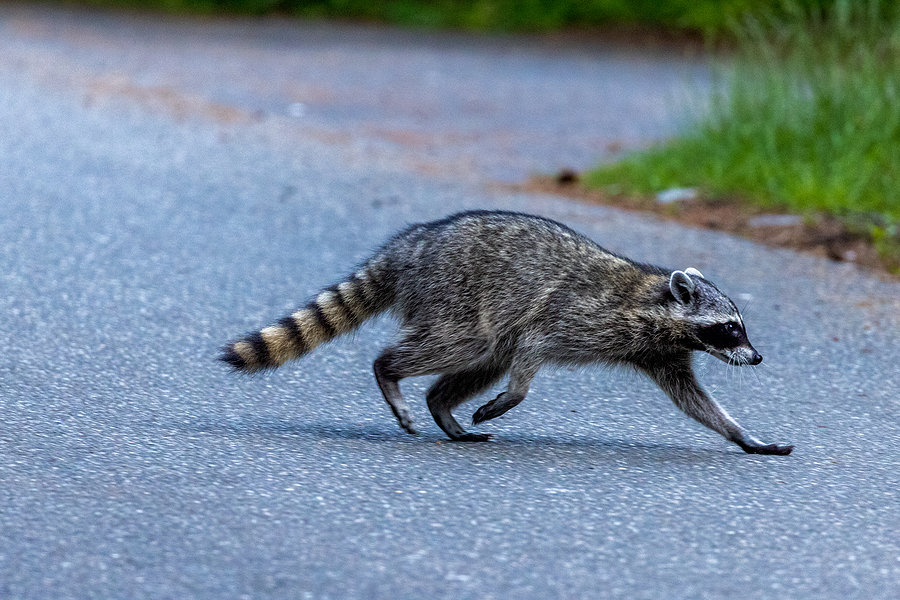
Raccoons are one of the most easily recognizable pests that homeowners deal with. These common wildlife are known for their distinctive black masks over their eyes and ringed tails. Raccoons have gray and black fur and are about the size of an average housecat or small dog. They have 5 fingers on each hand and are extremely coordinated. They are highly intelligent with excellent memories. Raccoons are found in every state of the US.
Raccoons are scavengers and mostly hunt for food at night. They will eat almost anything. They are also highly adaptable allowing them to live in a wide variety of habitats (urban, suburban, rural, forest, mountain, coastal, and more).
When raccoons nest in or near your house they can cause significant damage to both your property and your health. Their damage isn’t just limited to tipped over trashcans. In their search for a nesting site they will rip off shingles, fascia boards, and even chimney vents. Once inside your home, they can destroy insulation, chew through electrical wires, and contaminate your home with urine and feces. They will dig up your yard in search of grubs and even tear off decking to get under porches and decks.
Signs of raccoons on or near your property include:
Getting rid of raccoons can be difficult. They are crafty and can be difficult to trap. Here are some ways to prevent raccoons from taking over your home or yard.
Nearby food sources will attract females to the area to nest and also allow populations to grow rapidly. Eliminating food sources makes your property less attractive to raccoons and other wildlife. Make sure to use heavy trashcans with secure lids. You may consider putting your cans in a rack or tying them to a secure post to prevent tipping. If your lids aren’t secure, use bungee cord or wire to make sure lids are secure. Bring in pet food before nightfall. Try to deter raccoons from bird feeders by using raccoon-proof feeders, hanging from shepherd’s hooks, or bringing them in overnight. Pick up any fallen fruit or nuts from the ground. Consider installing fencing around gardens, ponds, or compost piles. Electric fence is preferable as raccoons can climb over or dig under regular fencing. Don’t intentionally feed raccoons as this will only attract more and increase the population.
Without a place to nest, raccoons will likely move on to a more hospitable environment. Clean up your yard and keep your grass mowed. Remove wood piles and thin out any overgrown shrubbery. Trim branches away from your roof, providing at least a 5′ gap between the roof and any trees. Get rid of any trellises or arbors that may allow access to your roof.
Raccoons like to nest in chimneys so make sure it is sealed when not in use with a chimney cap that is tightly secured. Make sure there are no animals inside your chimney before sealing it off. Inspect the exterior of your home and identify any other possible entry points, as well. Close off spaces under porches, decks, and sheds with wire mesh. Make sure the bottom edge of the wire is buried at least 6 inches deep and extends out at least 12 inches. Make sure to back-cover the wire with soil.
There are several repellents and products designed to scare raccoons with motion and light. Raccoons are highly intelligent and these products will only be effective until they realize there is no threat. Trapping can also be dangerous for homeowners as these nuisance wildlife carry a wide range of parasites and diseases that can be harmful to both humans and pets. Raccoons will bite or scratch if they feel threatened or if they have their young near them. They are known to carry rabies, roundworm, and canine distemper.
If you have an issue with raccoons or any other wildlife, consider contacting a professional pest control company who specializes in wildlife control and wildlife exclusion. They can identify where raccoons may be feeding or nesting and safely and legally trap and relocate them.
Identifying and Controlling Armyworms
How to Bring Your Lawn Back to Life This Spring
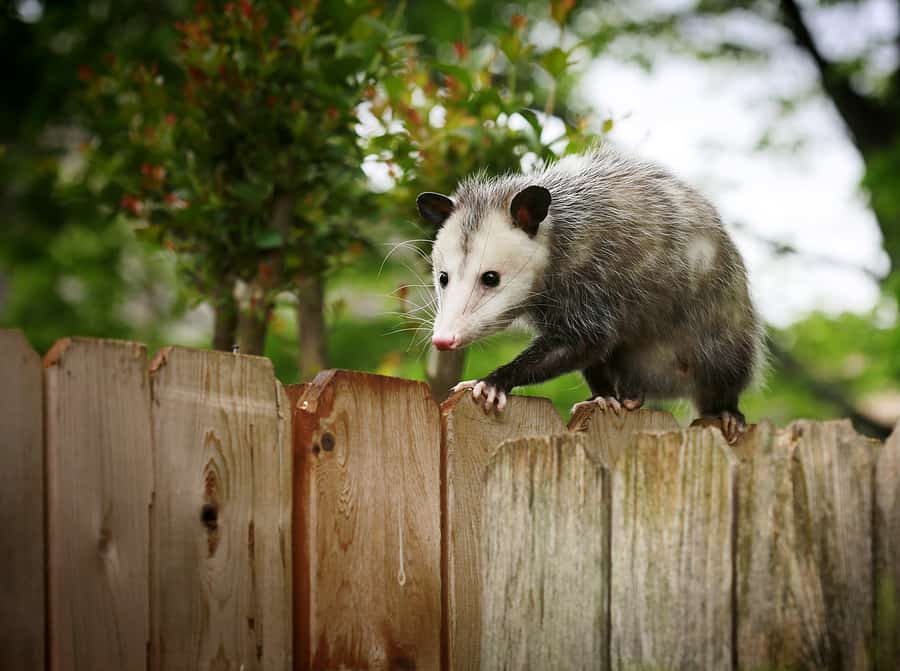
It’s minutes before you have to run out the door and make your commute to work. You make your coffee and look out the window, only to see last night’s dinner scattered throughout your yard! Unfortunately, your garbage has been rummaged through all night by a couple of wildlife pests. Two popular animals that are known to forage through trashcans and dumpsters for food are raccoons and opossums.
Raccoons, known for their distinctive black mask coloring on their faces, can range from just under 2 feet long to over 3 feet long. These animals are considered nocturnal and are rarely seen by humans. Be aware, though, spotting a raccoon during the day can be a possible sign they have rabies or other abnormal conditions.
Raccoons are scavengers, looking for food wherever they can find it, often foraging in trashcans and dumpsters. These skillful creatures can easily use their paws to open doors and lids to look for food. While they are omnivores, they prefer fruits and nuts over meat. Because they are creatures of habit, once these animals find a food source at your home, they will keep coming back until the food source is gone.
Another animal you’ll catch roaming around your trashcans is the opossum. Grey in color, opossums can range from 14” long to over 3 feet long, with their tails making up 50 percent of their total body length! These animals also tend to live near wet areas such as swamps and marshes.
While opossums are omnivores, they prefer insects and carrion over fruits and vegetables. As highly skilled climbers, you’ll find these creatures in trees, staying up there for as long as they can. They are also slow movers so don’t expect them to make a quick getaway! Opossums are generally not aggressive, though they will play dead if they are threatened.
Here are some tips to help prevent wildlife from rummaging through your garbage.
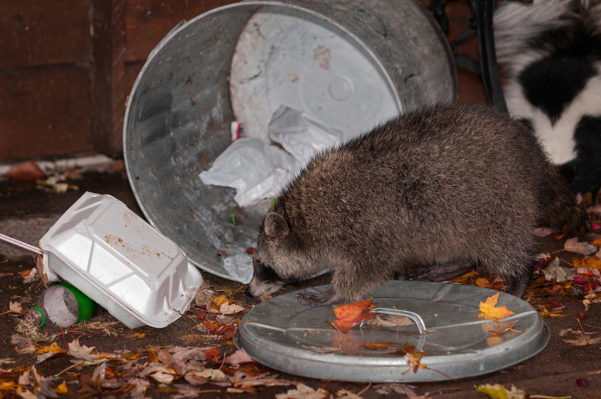
When you think of pest control the most common critters that come to mind are roaches, rats, bed bugs, mosquitoes, and other traditional pests. Wildlife may not be at the top of your list but these sneaky pests can wreak havoc on your home and your health. Two wildlife pests that often get into your home are possums and raccoons. While they are noticeably different in appearance, these two animals share many similarities. They are both highly adaptable to their surroundings and can be quite creative in seeking out food sources. They are both also known to carry diseases that can be harmful to humans. Do you know how to identify a possum or a raccoon? What can you do to prevent these pests from damaging your home and property?
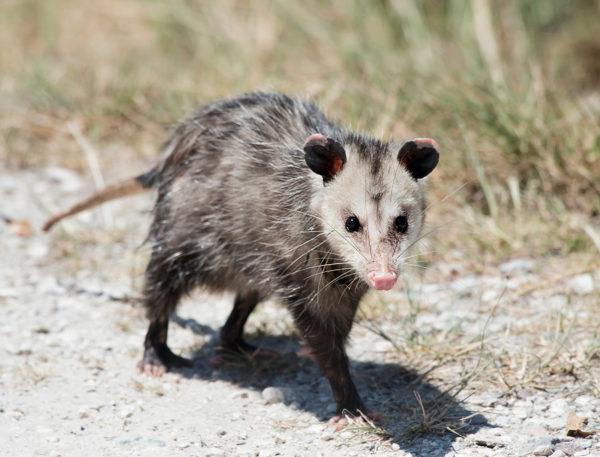
Possums are North America’s only marsupial species. They can range from 14″ long to over 3 feet long. Their tails make up 50% of their total body length. They can weight up to 13 lbs. Possums are scavengers and will forage in trashcans and dumpsters for food. They are omnivores but prefer insects and carrion over fruits and nuts. Possums are highly nocturnal and are rarely seen by humans. They prefer to live near water. Possums are found throughout eastern North America. Possums are slow movers but are highly skilled climbers. They can get into attics and under houses, especially in crawlspaces. They will play dead as a defensive tactic.
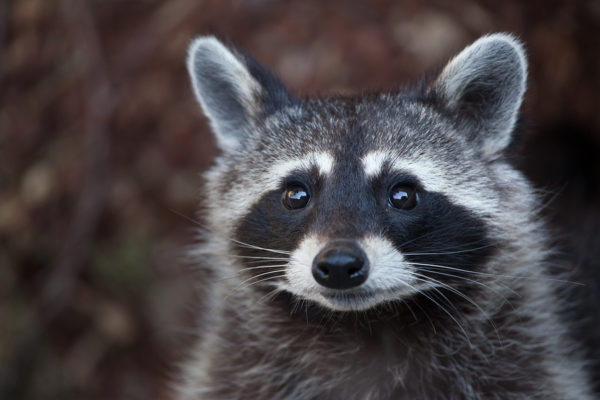
Raccoons can range from just under 2 feet long to just over 3 feet long. They can weigh up to 23 lbs. They have a distinctive black mask coloring on their faces. Raccoons are scavengers and will often forage in trashcans and dumpsters for food. They are quite dexterous and can use their paws to open doors and lids. They are omnivores but prefer fruits and nuts over meat. They are nocturnal and are rarely seen by humans. If you spot a raccoon during the day be aware – this is often (but not always) a sign of rabies or other abnormal condition in the raccoon. Raccoons are found throughout most of the United States, southern Canada, and northern South America. Raccoons are creatures of habit. Once they discover a food source at your house they will keep coming back over and over. They often access attics and roofs of homes causing significant damage.